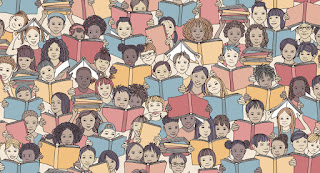It is one of the greatest downfalls of American education that those in power seem to be completely unaware of the hidden power of bilingual learners. These texts and videos reminded me so much of the Precious Knowledge documentary because of the ways that students experiencing their language and culture made them so much more engaged in education.
I watched the "Teaching Bilinguals" videos first before reading any texts and was so inspired at the stories of the success that those educators achieved in humbling themselves to be in a place where English may not be the primary language spoken and they may not be understanding everything their students are saying. As someone who works in education, it feels like a necessity to understand EVERYTHING that goes on in the classroom because of the fear that something important is happening and you don't know it. I so appreciated the perspective of the teacher who knew hardly any Spanish and was teaching her students from the place of "we can all learn something together", which is maybe the most engaging stance for a teacher to have in a classroom. It involves and validates the students in a way that a teacher who "knows everything" never can.
It was hard to follow those hopeful videos with the "Aria" article by Richard Rodriguez. I was so deeply sad reading their story of gradual estrangement from their language, culture, parents, and eventually themselves. The way the author described everything made me think of brainwashing their subconscious into feeling like they weren't validated in speaking Spanish anymore, like they no longer had ownership of the words. "After English became my primary language, I no longer knew what words to use when addressing my parents. The old Spanish words (those tender accents of sounds) I had used earlier-mama and papa-I couldn't use anymore. They would have been too painful reminders of how much had changed in my life."It is so tragic for a person to feel so detached from their first language, and I can imagine (and the author describes) causes an acute change in the way the person views themselves. "Today I hear bilingual educators say that children lose a degree of 'individuality' by becoming assimilated into public society... But the bilingualists simplistically scorn the value and necessity of assimilation." And the author goes on to say that assimilation does make public individuality possible. This was an interesting and complicating statement and while you can hear the heartbreak in the authors stories, they do acknowledge the value of gaining English and a public language.
"Teaching Multilingual Children" by Virginia Collier was a more difficult article for me to read because of all the technical educational guidelines and tips, though I gained some grounding understanding that helped me better understand "Aria". The emphasis on Caregiver speech was fascinating and reminds me so much of how I have viewed children learning their first language. "Eradication, which may be said to be the traditional view of the language-teaching profession as a whole, looks upon dialects other than standard as deficient in themselves, as deserving of the stigma they have attracted, and as the causes of severe problems in the total learning process including the acquisition of reading and writing skills", Guadalupe Valdes writes. The way I comprehended this is that educators moralize language and dialects as "right" or "wrong" and that when students can lose the old language and gain the new that they can access much better futures. This is a sad and deplorable use of time in school and educational experiences lose so much richness from the variety of students and background and languages if we just try to take away student's experiences prior to English.
I really enjoyed the emphasis on the important of literacy in the primary language before trying to enforce literacy of a second and new language and how this can hurt the child's primary language skills. "The 'most successful long-term academic achievement occurs where the students' primary language is the initial language of literacy'". This makes sense as a tool to not only affirm the primary language but to also give student's another tool in their tool belt while also enhancing their confidence.
I was looking through Google about the research being done on code-switching and found this really interesting, short video on research being done at NYU.
https://www.youtube.com/watch?v=W48ORvJ7uqM
This TED-Ed video describes the benefits of having a bilingual brain.









